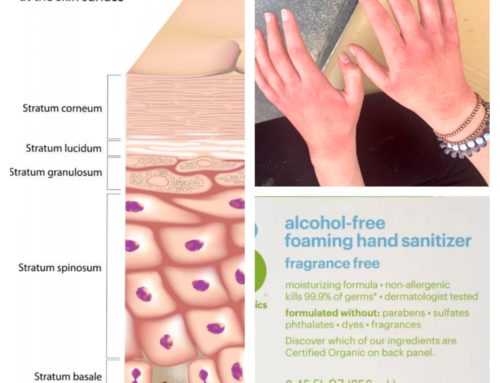Maskne (ˈMasknē/ ˈmæskni) Noun-Inflamed or infected sebaceous glands in the masked region of the face.
For all of us who are masking at work and school, we have new friends growing on our chin and cheeks. Here are some tips to prevent these guys from overtaking our face.
- Stop touching both your face and the inside of your mask!! Remind your children of this. We have oils and bacteria on our hands that readily clog micro-sized skin glands. Kids at school are putting masks on over their dirty and/or greasy post-lunch chins. Remind them to wash their chin and cheeks after lunch with mild soap and water. If they cannot access a sink, send a fragrance-free wet wipe (packed in a ziplock) to wipe away residual food and oils. Better yet, have them eat fresh fruit, vegetables, and whole grains to avoid the grease.
- Make sure your mask is clean; everyone should have 2-3 spare clean masks on them. Wash fabric masks without fabric softener. Look for masks that fit well so that you or your children don’t play with them. Edges of a mask can be irritating or rub, and this leads to skin breakdown, followed by dirt and oils clogging pores, and then acne. Avoid synthetic fabrics (such as nylon, polyester, and rayon) on the layer that rests against your skin. These are more likely to irritate your skin and cause breakouts.
- Gently wash your face with warm water, a washcloth (or clean hands) and mild cleanser am and pm (and no more than 3 times a day). Rinse and dry well. Don’t use overly abrasive scrubs or exfoliators on the face. For best success use a 2.5% Benzoyl Peroxide cleanser. Other options include salicylic acid, glycolic acid, or lactic acid cleanser. If you use 10% Benzoyl Peroxide you will overly dry your skin and create new problems that worsen mild acne.
- If your skin gets dry, use only non-comedogenic moisturizers. Always look for the word “Noncomedogenic”. That means the ingredients won’t clog pores. Ceramides, Hyaluronic acid, and Dimethicone all work great. Brands trusted by Dermatologists: Cerave, Neutrogena, Vanicream, and Cetaphil.
- Use non-comedogenic makeup sparingly and always wash it off at the end of the day. Don’t use hair products such as fragrances, oils, and gels. Wash your hair often and keep it off your face.
- Talk to your physician about prescription treatments. A person’s lifetime identity is formed during the high school years. Don’t ignore a teenager’s emotions if they are associated with their acne. A simple topical combination of adapalene and benzoyl peroxide may be all they need. Call your pediatrician for help.



